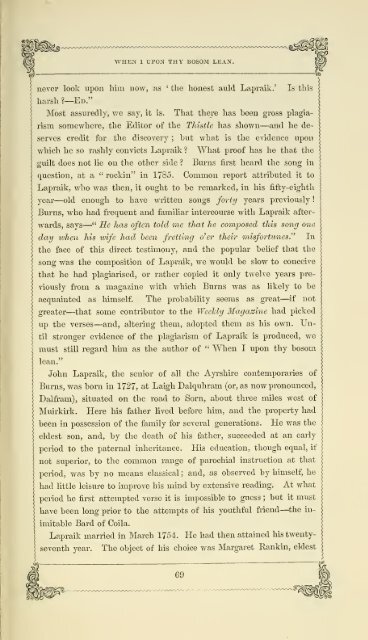[A composite volume : containing The ballads and songs of Ayrshire ...
[A composite volume : containing The ballads and songs of Ayrshire ...
[A composite volume : containing The ballads and songs of Ayrshire ...
You also want an ePaper? Increase the reach of your titles
YUMPU automatically turns print PDFs into web optimized ePapers that Google loves.
I<br />
WHEN<br />
—<br />
!<br />
I UPON THY BOSOM LEAN.<br />
never look upon him now, as the honest auld Lapraik.' ' Is this<br />
harsh Ed."<br />
Most assuredly, we say, it is. That there has been gross plagiarism<br />
somewhere, the Editor <strong>of</strong> the Thistle has shown—<strong>and</strong> he deserves<br />
credit for the discovery ; but what is the evidence upon<br />
which he so rashly convicts Lapraik What pro<strong>of</strong> has he that the<br />
guilt does not lie on the other side Bm-ns first heard the song in<br />
question, at a " rockin" in 1785. Common report attributed it to<br />
Lapraik, who was then, it ought to be remarked, in his fifty-eighth<br />
year—old enough to have written <strong>songs</strong> forty years previously<br />
Burns, who had frequent <strong>and</strong> familiar intercoui'se with Lapraik afterwards,<br />
says— " He has <strong>of</strong>ten told me that he composed this song one<br />
day when his tvife had been fretting o'er their misfortunes." In<br />
the face <strong>of</strong> this direct testimony, <strong>and</strong> the popular belief that the<br />
song was the composition <strong>of</strong> Lapraik, we would be slow to conceive<br />
that he had plagiarised, or rather copied it only twelve years previously<br />
from a magazine with which Burns was as likely to be<br />
acquainted as himself. <strong>The</strong> probability seems as great—if not<br />
greater—that some contributor to the Weekly Magazine had picked<br />
up the verses—<strong>and</strong>, altering them, adopted them as his own. Until<br />
stronger evidence <strong>of</strong> the plagiarism <strong>of</strong> Lapraik is produced, we<br />
must still regard him as the author <strong>of</strong> " Wlien I upon thy bosom<br />
lean."<br />
John Lapraik, the senior <strong>of</strong> all the <strong>Ayrshire</strong> contemporaries <strong>of</strong><br />
Burns, was born in 1727, at Laigh Dalquhram (or, as now pronounced,<br />
Dalfram), situated on the road to Sorn, about three miles west <strong>of</strong><br />
Muirkirk. Here his father lived before him, <strong>and</strong> the property had<br />
been in possession <strong>of</strong> the family for several generations. He was the<br />
eldest son, <strong>and</strong>, by the death <strong>of</strong> his father, succeeded at an early<br />
period to the paternal inheritance. His education, though equal, if<br />
not superior, to the common range <strong>of</strong> parochial instruction at that<br />
period, was by no means classical ; <strong>and</strong>, as observed by himself, he<br />
had little leisure to improve his mind by extensive reading. At what<br />
period he first attempted verse it is impossible to guess ;<br />
but it must<br />
have been long prior to the attempts <strong>of</strong> his youthful friend—the inimitable<br />
Bard <strong>of</strong> Coila.<br />
Lapraik married in March 1754. He had then attained his twentyseventh<br />
year. <strong>The</strong> object <strong>of</strong> his choice was Margaret Rankin, eldest

















